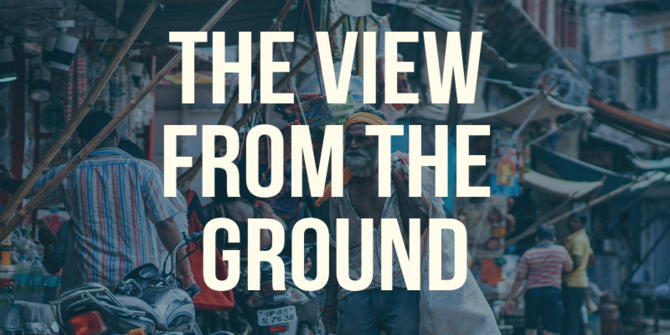As COVID-19 disrupts established research norms, many methodological and ethical questions have come to the forefront of the debate on how we study South Asia. Here Nabeela Ahmed, Sally Cawood, Sarita Panday, Megnaa Mehtta, Glyn Williams, Jiban Kumar Karki and Ankit Kumar (Research collective, University of Sheffield) reflect on their recent discussions on whether researchers should consider changing the way they conduct their work in the wake of the pandemic.
Five months into the pandemic, calls for funding for research to examine the impacts of COVID-19 have become the new ‘normal’ in academia. Whilst important, these calls are often structured within a rapid time frame and potentially distract us from remaining focused on historically embedded inequalities exacerbated by the pandemic. Be it the impacts of Cyclone Amphan in the Sundarbans, the migrant crisis in India, exploitation of garments and waste workers in Bangladesh, or gendered health-inequalities in Nepal, and their parallels here in the UK where underprivileged populations are twice as likely to die of COVID-19. However as academic research begins to ‘normalise’ following a brief disruption, it has become crucial not to lose this precious moment of reflection to assess how we can best mobilise our existing and future research to address rising inequalities in the context of COVID-19 in South Asia.
In the wake of COVID’s disruption to research, we (researchers and lecturers at the University of Sheffield) came together as a loose collective working on South Asia to discuss shared challenges and experiences. Our conversations are by no means representative of a diverse and contested region (with glaring omissions of Pakistan and Sri Lanka for example). However, the region shares pertinent overlaps in relation to histories of domination, either through Empire or regionally in the case of Nepal and Bangladesh, and ongoing discrimination based on gender, caste, religion, ethnicity and citizenship status. Two key questions emerged from our discussions, which continue to be urgent as the pandemic’s long-term effects unfold:
- How, or should, we change how we work (including ethics, partnerships and methods) in the context of COVID?
- What does it mean to do research on COVID-19 versus researching pre-existing research themes during COVID-19?
Designing a new ethics?
Our discussions started, and frequently returned, to the question of ethics. Ethics in research institutions can often be relegated to a low priority stage of the research process and dismissed as a bureaucratic hurdle before getting to the ‘research bit.’ They are central to the entire process of research however, starting from choice of topic (often dictated by short-term funding structures) and theory-building, to methodological design and practical implementation, through to analysis and dissemination.
In the context of COVID-19, we note how decision-making power over funding structures, especially in GCRF projects, is commonly oriented toward the UK rather than with local partners – academic institutions, policy, advocacy or grassroots organisations. The crisis exposes the potential for burdens and increased risk to fall on research partners and participants to deliver projects and utilise funds within the given timeframe (often with no or little flexibility). Given that partners are also going through the crisis, often with fewer resources, and in varied governance settings, face-to-face (and other forms of) fieldwork is not always possible, and may look very different in the months and years to come.
Shifting geographies of research partnerships
Building on the above, we also note that COVID-19 may present an opportunity to reposition power with local partners and researchers, and challenge the global North-South knowledge hegemony that persists and is continuously reproduced. This is especially relevant in light of differential geographies, timeframes of lockdown and border closures. For example, dates for easing internal lockdowns – but not national or international borders – are imminent (at the time of writing) in both India and Nepal: could this enable local researchers to continue their work on pressing issues?
As researchers based in the UK, we rely on meaningful and lasting collaborations with our partners across South Asia. However, this disconnect raises important questions about who we choose to work with, how these partners represent certain individuals and groups, and how this can filter out the diversity of everyday experiences. We are wary not to reproduce or create new asymmetries of power, information or resources.
Elites with, for example, greater access to digital information, can create an asymmetry of power not only within the bounds of field contexts but across geographies of partnership – a dynamic that can, and has historically, been reciprocated in neo-colonial research practices in the ‘global North’. The political and local contexts within the South Asian region – such as social media or press clampdowns in Bangladesh, Nepal and India – can also lead to intermediaries withholding or distorting information across geographies, for fear of reprisal.
The political implications of diplomatic, trade, aid or other political relations between the UK and countries in South Asia have also historically been volatile and subject to change. As the COVID-19 crisis unfolds, these shifting relations will impact travel restrictions, visa policies, funding opportunities and mutual exchanges of information between partners. We agreed that it is vitally important to remain focused on the politics of representation, as well as the politics of knowledge production, moving forward.
Changing how we ‘do’ research now – and in future
We also talked extensively about remote methods, and whether we should, in fact, change methods or approach at all, taking note that we cannot all ‘switch’ online, especially in ethnographic or participatory methodologies, or indeed re-centre our work onto COVID-19 specifically.
Anthropologists, in particular, pride themselves on research methods premised on living, working, participating and physically being a part of a community for an extended period of time. Participant observation or ‘deep hanging out’ which is as much about asking questions as it is about observing and participating in daily life is simply not possible online. We also noted that, while online methods may open doors to ‘more’ participants, the ethics of these methods remain poorly understood, especially in relation to accessibility, privacy and safety of online platforms for communication in workshops or meetings. How does data protection and GDPR compliance work with online methods of data collection? Can these methods reach remote partners and participants with limited access to data or equipment, or overcome language barriers? Equipment deficits, busy ‘firefighting’ schedules, fast-changing priorities and frequent staff turnover among local partners can be significant challenges to deploying online methodologies and re-designing research projects, many of which remain UK-centric in their management.
Important questions also emerged here – and across all discussion points – over power, positionality and the role of external and foreign researchers. How do the ethics and dynamics of positionality persist or change in the switch to online methods? What can be done to develop more equitable and locally-based responses, or reach global platforms that are currently dominated by elite voices?
However, we also noted the potential value of externally based and foreign critical voices in light of rising political tensions and surveillance within and between countries across the region. Equally important is the power of such researchers to be able to create a platform where local people and their authorities can have a debate and dialogue, which otherwise would not be possible for many marginalised groups in South Asia. Leveraging these privileges to disseminate information with fear of imprisonment or retribution may be one way to share risks and burdens with partners, colleagues and participants in-country.
Rethinking ethics, partnerships and methods in the context of COVID-19
Returning to our initial open questions, and building on the collective thoughts presented here, we end with some potential pathways towards a more ethical, reflexive and critical agenda for researchers working in, and across, the South Asian region:
- Continue to work collectively on existing issues that have been further exacerbated by COVID-19, pertaining to discrimination and rising inequality across the region
- Address the ways we outsource or capture ‘risk’ in working with partners, local researchers and participants across South Asia
- Lobby research funders to make budget structures equitable; embed ethical practice within calls and criteria (rather than leaving this to individual institutions); provide greater flexibility with time frames to enable relationships to build over time (for both qualitative and quantitative work) and challenge knowledge asymmetries (and search for the few funders that enable this)
- Think carefully and collectively about possible ‘alternative’ methods that are inclusive, and work closely with long-term partners to design and deliver this
- Build trust and long-term relationships not only with individuals, but with institutions, collectives, movements and groups
- Work towards co-authorship with research assistants and partners in publication outputs as another way of shifting skewed power imbalances in academic authorship
- Promote a culture of co-designing research and co-producing knowledge together with Southern partners rather than treating them as recipients of ideas and their token participation
- Demand shared learning with visits by partners from the South (e.g. requesting to address visa issues when partners want to visit the UK to share knowledge and experiences)
- Work on and push for alternate methods for shared learning, for example, by working towards integrating digital participation in workshops and conferences (not just due to climate concerns but also a need for equitable access) and by integrating budgets for internet data in funding bids.
The disruption that COVID-19 has forced upon our research and teaching practices in the UK gives pause for us to reflect on the ways in which international research projects are conceptualised and implemented. While our reflections bear on our given region of focus and varied career stages, situating the impacts of COVID-19 in context has proved central to identifying positive steps forward in this global crisis.
This article gives the views of the authors, and not the position of the South Asia @ LSE blog, nor of the London School of Economics. Featured photo: Photo of bulb. Credit: AbsolutVision @freegraphictoday, Unsplash.
If you would like to know more about the informal collective at Sheffield mentioned in this blog, email Nabeela Ahmed (nabeela.ahmed@sheffield.ac.uk) or Sally Cawood (s.cawood@sheffield.ac.uk)








Asking questions are in fact nice thing if you are not understanding
something totally, but this piece of writing gives good understanding even. https://www.timescapeusa.com/collections/buben-zorweg